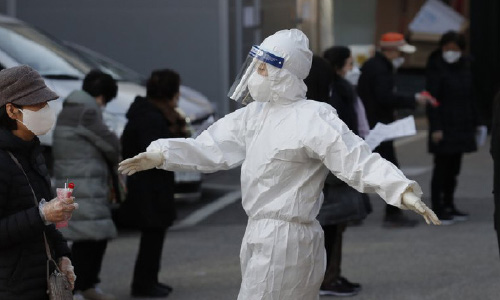SEOUL- South Korea has reported 950 new coronavirus cases, its largest daily increase since the emergence of the pandemic, as fears grow about overwhelmed hospitals in the greater capital area.
The figures released Saturday brought the country’s caseload to 41,736, after health officials added more than 8,900 cases in the last 15 days alone. Six COVID-19 patients died in the past 24 hours to bring the death toll to 578.
Nearly 680 of the new cases came from the densely populated Seoul metropolitan area, where health workers have struggled to track transmissions popping up from just about everywhere, including hospitals, long-term care facilities, restaurants, saunas, schools and army units.
Infections were also reported in other major urban centers, including Busan, Gwangju, Daejeon, Ulsan and Daegu, a southeastern city that was the epicenter of the spring outbreak.
The government had eased its social distancing restrictions to the lowest tier in October despite experts warning about a viral surge during colder weather, when people spend longer hours indoors.
Officials restored some restrictions in recent weeks, such as shutting nightclubs and allowing restaurants to provide only deliveries and takeouts after 9 p.m., and could be forced to clamp down on economic activity further.
Prime Minister Chung Sye-kyun said South Korea may have to elevate social distancing restrictions to the highest level, which includes a ban on gatherings of more than 10 people, school closures, a halt to to professional sports and requiring companies to have most of their employees work from home.
President Moon Jae-in in a Facebook message apologized for his government’s failure to contain the outbreak despite months of measures that hurt the economy. He pleaded for vigilance, saying the country was going through its “last crisis before the arrival of vaccines and treatment.”
Health officials are also trying to ramp up testing and prevent the virus from being spread by those with mild or no symptoms.
From Monday, rapid antigen tests at emergency rooms, intensive care units and remote hospitals will be covered by the national health insurance, which would cost recipients about 8,000 won ($7) each.
Antigen tests and another form of rapid testing based on saliva samples will also be available at designated sites in the capital area free of charge and regardless whether people are symptomatic.
The country will also deploy more than 800 police officers, troops and civil servants to support contact tracing. (AP)
Home » World » S. Korea reports 950 cases, biggest daily jump
S. Korea reports 950 cases, biggest daily jump

